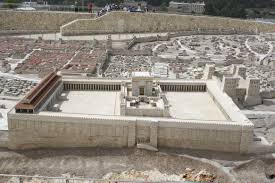Jesus was a Jew and His experience of religion
is in the context of the later stages of tribal or ethnic organization. The
Jewish faith of His time was badly split. The ruling class that controlled the
temple in Jerusalem had made a number of political compromises with the Roman
overlords in order to preserve some autonomy for the faith. Dissident groups
were widespread among the people. Among the original twelve disciples of Jesus
was at least one Zealot, an underground movement that on several occasions
sparked armed conflict with the Romans. (This eventually resulted in two devastating
wars about 35 and 85 years after Christ. The first saw the destruction of the
temple and the second resulted in the Jewish people being expelled from Judea.)
Many of Jesus’ disciples were evidently
Pharisees, a conservative movement that sought to protect the religious
heritage of Judaism from contamination by the surrounding cultures. In their efforts
to “build a hedge around the law of God,” more and more emphasis was being put
on the man-made rules, and hypocritical standards. The Pharisees judged the
common people very harshly. Sickness was condemned as God’s judgment on sin and
the righteous were encouraged to make a great show of religion while trampling
on the poor and suffering. It was in this context that Jesus, the Son of God,
came into the world.
Jesus was not born into a wealthy or religiously
elite family. His father taught Him the art of carpentry. Jesus worked with His
hands and was poor. However, from a very young age, Jesus felt comfortable in
the presence of the religious elite and was able to discuss religion with the
highly educated. At twelve years old, when Jesus’ parents lost Him in the crush
of Jerusalem’s crowds, they found Him “in the temple courts, sitting among the
teachers, listening to them and asking them questions. Everyone who heard Him
was amazed at His understanding and His answers.” (Luke 2:46-47)
Jesus did not attack organized religion, but He
did clearly establish His place outside the dominant religion of His time. The
Pharisees attacked Him for eating with sinners, associating with the hated
tax-collectors and allowing women of ill repute to touch Him. They particularly
objected to His approach to observing the Sabbath which ignored their strict
rules and focused on the notion that God made the Sabbath for humanity. They
watched Him constantly to find His infractions of their laws. He had to remind
them very sternly that “If you had known what these words mean, ‘I desire mercy
not sacrifice,’ you would not have condemned the innocent. For the Son of Man
is Lord of the Sabbath.” (Matt 12:7,8) They did not recognize their God in
human form, and they did not remember the nature of God. God’s law that was
meant to bring them rest and a closer relationship with the Divine, was
misinterpreted to make it a crime to help the poor or heal the sick on the holy
day. The Sabbath, that had been created in the beginning to be a blessing to
the people, a day of rest and communion with their God, had turned into a day
burdened down with so many rules and obligations that the people could no
longer see the beauty of God in the day.
Jesus could be very critical of the religious
elite. He pointed out their hypocritical actions and ideas and contrasted them
with God’s will to help their fellow man and love each other. In fact, His
criticism could get incredibly powerful, telling them directly, “You belong to
your father, the devil, and you want to carry out your father’s desire.” (John 8:44)
He directly criticized the religious leaders, saying, “Woe to you, for you are
like unmarked graves which men walk over without knowing it.” (Luke 11:44) They
thought of themselves as important, superior and favored of God, but they had
fallen so far away from God’s will that they were, in fact, in direct
opposition to Him.
However, despite Jesus’ strong criticism of the
leadership and individuals who had so polluted God’s ways, Jesus was supportive
of the essentials of the Jewish religious structure. When He was found in the
temple as a child, and His parents questioned Him, and He responded, “Didn’t
you know I had to be in my Father’s house?” (Luke 2:49) His righteous
indignation was roused when He saw the misuse of the temple, being used as a
marketplace instead of as a holy place of worship. He made a whip, turned over
tables, scattered money and shouted, “How dare you turn my Father’s house into
a market!” (John 2:16)
Despite the corruption within the temple, Jesus
respected and defended the institution. His aim was not to ignore it or destroy
it, but to purify it. He said, “Do not think that I have come to abolish the
Law or the Prophets; I have come to fulfill them. I tell you the truth, not the
smallest letter, not the least stroke of a pen, will by any means disappear from
the Law until everything is accomplished.” (Matt 5:17, 18)
Organized religion was established in God’s eyes
to improve human life, to point humanity to the promise of a Savior and to
teach essential truths. Jesus attended the feasts, worshipped at the temple and
followed the basic Law of God. Jesus simply brought their perspective back to
the loving God that religion was meant to convey, showing them the original
purpose of religion; to worship God and to help humanity.

No comments:
Post a Comment